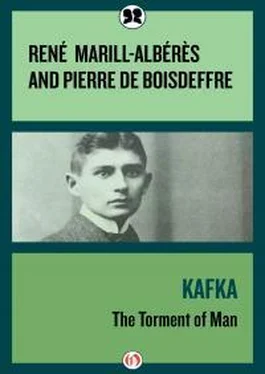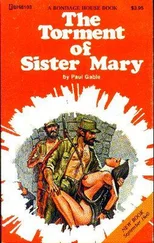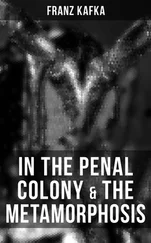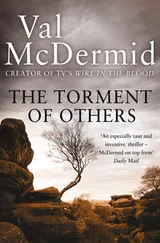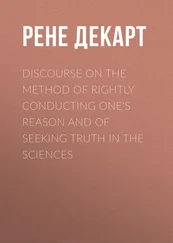To be sure, Kafka does not deny that literature is his sole vocation. Twenty texts bear witness to this certainty. Writing gives meaning to his “monotonous, empty, misdirected” life. It is “the only road that can lead to progress.” A vast world seethes inside his head. “Better to burst a thousand times than to push it back inside myself or bury it; for that is why I am here; on this subject I have not the least doubt.” Literary creation even confers upon him a certain invulnerability. When he writes, he feels “bold, naked, powerful, extraordinary.” But he is never sure of the result. His state of mind is that of a mountain climber lost on a high peak: he knows that he will be saved if he reaches shelter before nightfall; he sets out courageously, but something tells him that he will never arrive in time. No matter what, he is condemned: condemned if he stays where he is, he is not saved because he advances. Nor must he become impatient: impatience and negligence issue from the same sin against Spirit. One would have to believe without needing hope , and this is manifestly impossible.
Twenty times Kafka—like Proust—undertook to “change his way of living” in order to devote himself exclusively to the life of the spirit, to the exploration of the other world.
But it is impossible to calculate how much strength I have for this undertaking. It may already have vanished forever; it may come back to me once again, even though the circumstances under which I live are not favorable to it. So I vacillate, fly incessantly to the peak of the mountain, but cannot rest on the height even for a moment. Others also falter, but they are in lower regions and have more strength. Faced with the threat of falling, they are caught on the wing by a close relative who walks beside them and is there for this purpose. But I falter on the heights, not, unfortunately, because of death but because of the eternal torments of death. 12
In order to climb to “the peak of the mountain” Kafka was willing to cut the bonds that still linked him to men “in lower regions”—occupation, family, country, church—and to assume responsibility for his singularity. Fortunately—or unfortunately—he was a Jew, and “a Jew is nowhere a stranger and nowhere fully assimilated.” Everything around Kafka seemed to anticipate death: Czechoslovakia in 1924, like Austria-Hungary in 1914, was but a fragile conglomeration of heterogeneous nationalities coveted by a Germany which would soon fall prey to Hitlerism. Kafka too was suspect: suspect as a Jew in the eyes of the Czechs and Germans around him, suspect as a German and a Czech among the Jews. But he was a German only by virtue of his language. “Thus his fate as a writer is inscribed, like his life, under the sign of the impossible: impossibility of not writing, impossibility of writing in German, impossibility of writing in another language. To these he would have liked to add a fourth impossibility: the impossibility of writing.” 13The result was this disquieting consequence: literature was for him only the temporary state of someone who writes his testament “Just before hanging himself”; but this temporary state “may well last a lifetime.”
Caught between these two fires—the impossibility of writing and the even greater impossibility of not writing—Kafka accepted his impossible vocation. He plunged to the bottom of the abyss. Wandering like a sleepwalker in an infrahuman universe, he found the answer to the question of his original anguish. He knew that he had destroyed any semblance of human equilibrium within himself. What counted was no longer this life but the other life . “He gives the appearance of working to feed and clothe himself … but each visible mouthful is matched by an invisible mouthful, each visible garment by an invisible garment.” Each sunny morning reminds him that he has no future except his death. He does not fear it, for it is but an apparent end. “Everything happens as if interaction between the universal and the particular occurs on the real stage while life in the universal is inscribed only on the backcloth.” Death is only a door to pass through, the end of a terrestrial fever.
For a long time he had believed—still like Proust—that his creation would be his salvation. He soon had to admit that it was also a terrible ordeal. Still, he continued to write “in spite of everything, at any price.” It was no longer a question of salvation but of survival—not of preserving life but of avoiding its complete loss.
He no longer had any doubts. His quest was to culminate in madness. Since the night of December 22, 1912, when he wrote “The Judgment,” he had transcended “the last terrestrial frontier.” Committed to a route “which deviates from the human route,” sealed alive inside his own literary creation, “incapable of everything except suffering” and “extracting words from the void,” fleeing from his equals not in order to live in peace but in order to die in peace , “banished from down there, rejected here, overwhelmed at the dividing line,” Orpheus descended to the underworld and would not return to the surface.
To find the matchless pearl he paid the price from which all others recoiled: he paid it not only with his happiness but with the integrity of his spirit. The cries that echo through the last pages of the Diary are not only the cries of a drowned man “pounded for millenniums under oceanic pressures”; they are also the cries of a man who cannot find consolation for his failure and who still gropes for the Promised Land. Yet he himself had given the answer: “It is not because his life was too short that Moses failed to reach Canaan but because his was a human life.”
Kafka’s words, like his writings, are striking in their originality, in their “congenital indifference to customary ideas.” 14They are free of platitudes and, to an even greater degree, banality. The inimitable logic of his thought resembles the unfolding of “a strictly individual narrative in which the different moments are obscure events which have never before been reproduced and will never again be reproduced.” 15
Even in the case of current events, his reflections reveal profound insights. As early as 1920, for example, he had not only had a presentiment of the direction which anti-Semitism was to take but had understood it perfectly. “Jews and Germans,” he told his friend Gustav Janouch, “are outsiders.” Is it because of their qualities that they are hated? No. “The reason for this hatred goes even deeper. In the final analysis, it is religious. This is easily discernible in the case of Jews but less so in the case of Germans, for their temple has not yet been destroyed. But that will come.”
In the same way, and even though he claimed that he understood nothing about politics, Kafka had divined the religious tendency of the Russian revolution (“But Bolshevism attacks religion! It does this because it is itself a religion”). He had glimpsed, in the turmoil of the twenties, “The beginnings of a terrible religious war.” As he was passing a procession of workers, marching with flags unfurled, he murmured:
They are masters of the street and think that they are masters of the world. And yet they are wrong. Behind them come secretaries, bureaucrats, professional politicians—all of the modern sultans whose accession to power they are facilitating. The revolution subsides, leaving only the slime of a new bureaucracy. The chains of tortured humanity are forged from administrative papers. 16
Had the lonely Prague hermit divined Stalinism even before the death of Lenin?
Such is the absurd genius—in contrast to the solar genius of a Goethe or Hugo—of Kafka: he sees further than humanity but does not see his feet. His intelligence illuminates history but he is incapable of applying it to the conduct of his life. Kafka knows but one definite thing, “and that is suffering.” He does not recoil in its presence, for “the writer’s mission is to guide that which is accidental into that which is isolated and mortal to the infinite life, to transform that which conforms to the law.”
Читать дальше
